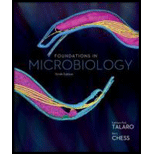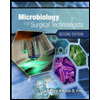
Foundations in Microbiology
9th Edition
ISBN: 9780073522609
Author: Kathleen Park Talaro, Barry Chess Instructor
Publisher: McGraw-Hill Education
expand_more
expand_more
format_list_bulleted
Concept explainers
Question
Chapter 20.L2, Problem 10CT
Summary Introduction
To determine:
- The probable pathogen in the given case
- The likely source of the pathogen
- The pathologic effect of the pathogen
Introduction:
In the given case, a three-year-old was brought with complaints of fever, diarrhea and malaise. She had abnormal kidney and liver numbers and anemia. She had consumed a meal of beef teriyaki.
Expert Solution & Answer
Want to see the full answer?
Check out a sample textbook solution
Students have asked these similar questions
1. Explain the structure and properties of atoms and chemical bonds (especially how they relate to DNA and proteins). Also add some pictures.
1. In the Sentinel Cell DNA integrity is preserved through nanoscopic helicase-coordinated repair, while lipids in the membrane are fortified to resist environmental mutagens. also provide pictures for this question.
Explain the structure and properties of atoms and chemical bonds (especially how they relate to DNA and proteins). Also add some pictures.
Chapter 20 Solutions
Foundations in Microbiology
Ch. 20.1 - Explain the effect of the virulence factor common...Ch. 20.1 - Identify those people most at risk of developing a...Ch. 20.1 - Briefly describe the human infections caused by...Ch. 20.1 - How can antibiotic treatment of a gram-negative...Ch. 20.2 - Name the genera of bacteria that are...Ch. 20.2 - Outline the pathology and epidemiology of...Ch. 20.2 - Explain the epidemiology of Francisella tularensis...Ch. 20.2 - Prob. 6ELOCh. 20.2 - Prob. 7ELOCh. 20.2 - Prob. 8ELO
Ch. 20.2 - List the four genera of bacteria that cause...Ch. 20.2 - Prob. 4CYPCh. 20.2 - Prob. 5CYPCh. 20.2 - Prob. 6CYPCh. 20.2 - What is unusual about the reservoir of Legionella?...Ch. 20.3 - Recall the medically important members of the...Ch. 20.3 - Prob. 10ELOCh. 20.3 - Explain the importance of the three major surface...Ch. 20.3 - Name the key characteristics shared by the...Ch. 20.3 - Explain what is meant by IMViC.Ch. 20.3 - Prob. 10CYPCh. 20.3 - Prob. 11CYPCh. 20.3 - Briefly describe the methods used to isolate and...Ch. 20.3 - Prob. 13CYPCh. 20.4 - Differentiate among the major enteric pathologies...Ch. 20.4 - Explain the role of E. coli in infantile and...Ch. 20.4 - Prob. 14ELOCh. 20.4 - Prob. 14CYPCh. 20.4 - Prob. 15CYPCh. 20.4 - Justify treating E. coli Ol57:H7 differently from...Ch. 20.4 - Prob. 17CYPCh. 20.5 - Differentiate between true noncoliform enteric...Ch. 20.5 - Distinguish the pathologies of typhoidal and...Ch. 20.5 - Identify the possible sources of Shigella...Ch. 20.5 - Prob. 18ELOCh. 20.5 - Prob. 19ELOCh. 20.5 - Prob. 18CYPCh. 20.5 - Prob. 19CYPCh. 20.5 - What are the Five F’s and how do they relate to...Ch. 20.5 - Prob. 22CYPCh. 20.5 - Which body systems are commonly infected by...Ch. 20.5 - Describe the epidemiology and pathology of...Ch. 20.L1 - A unique characteristic of many isolates of...Ch. 20.L1 - Prob. 2MCQCh. 20.L1 - Prob. 3MCQCh. 20.L1 - A classic symptom of pertussis is a. labored...Ch. 20.L1 - Prob. 5MCQCh. 20.L1 - Prob. 6MCQCh. 20.L1 - Prob. 7MCQCh. 20.L1 - Which of the following is a major difference...Ch. 20.L1 - A complication/complications of typhoid fever...Ch. 20.L1 - Prob. 10MCQCh. 20.L1 - Prob. 11MCQCh. 20.L1 - Haemophilus influnzae is ____________ and requires...Ch. 20.L1 - Prob. 13MCQCh. 20.L1 - Prob. 14MCQCh. 20.L1 - Single Matching. Match the infectious agent with...Ch. 20.L1 - Prob. 1CSRCh. 20.L1 - Prob. 2CSRCh. 20.L1 - Prob. 3CSRCh. 20.L1 - Prob. 1WCCh. 20.L1 - What are unique features in the epidemiology of E....Ch. 20.L1 - Explain several practices an individual can use to...Ch. 20.L1 - Prob. 4WCCh. 20.L1 - Briefly outline the zoonotic infections in this...Ch. 20.L2 - What is the logic behind testing for E. coli to...Ch. 20.L2 - Identify the genera with the following...Ch. 20.L2 - Given that so many infections arc caused by...Ch. 20.L2 - Prob. 4CTCh. 20.L2 - Students in our classes sometimes ask how it is...Ch. 20.L2 - Explain lhe reasons for an increase in numbers of...Ch. 20.L2 - Compare and contrast the pathology, diagnosis, and...Ch. 20.L2 - Prob. 8CTCh. 20.L2 - Prob. 9CTCh. 20.L2 - Prob. 10CTCh. 20.L2 - "There is no circumstance [in which] you can cook...Ch. 20.L2 - Use figure 20.5 a, b as a reference guideline for...
Knowledge Booster
Learn more about
Need a deep-dive on the concept behind this application? Look no further. Learn more about this topic, biology and related others by exploring similar questions and additional content below.Similar questions
- In the Sentinel Cell DNA integrity is preserved through nanoscopic helicase-coordinated repair, while lipids in the membrane are fortified to resist environmental mutagens. also provide pictures for this question.arrow_forward1. Explain how genetic information is stored, copied, transferred, and expressed. Also add some pictures for this question.arrow_forward!. Describe biological macromolecules (DNA, RNA, proteins, lipids, etc.) and how they function in the cell. also provide some images for this question.arrow_forward
- I need assistance with experienced tutor. Thanks.arrow_forwardH3C H Br-Br C=C H₂O H3C-CH2 CH3 (large excess)arrow_forwardmarvin dunham, a 68 year old male, is admitted to the hospital with a deep laceration to the forehead. dr. wallace applies a pressure dressing to his head to control the bleeding. what is the pcs codearrow_forward
- Explain the impact William B. Travis has made.arrow_forwardIf PCR was performed on the fragment of DNA shown below using "5'-TAGG-3" and "3'-TCTA-5'" as the primers, how many base pairs long would the PCR product be? To help with this, remember the antiparallel structure of DNA and that primers are complementary and antiparallel to the target sequence that they bind to. Hint: Check out the 5' and 3' labels....they are important! 3’- T A T C C G A C A A T C G A T C G A T T G C C T T C T A A -5’ 5’- A T A G G C T G T T A G C T A G C T A A C G G A A G A T T – 3’arrow_forwardWhen setting up a PCR reaction to act as a negative control for the surface protein A gene... Which primers will you add to the reaction mix? mecA primers, spa primers, mecA primers and spa primers, no primers What will you add in place of template? sterile water, MRSA DNA, Patient DNA, S. aureus DNAarrow_forward
- Draft a science fair project for a 11 year old based on the human body, specifically the liverarrow_forwardYou generate a transgenic mouse line with a lox-stop-lox sequence upstream of a dominant-negative Notch fused to GFP. Upon crossing this mouse with another mouse line expressing ectoderm-specific Cre, what would you expect for the phenotype of neuronal differentiation in the resulting embryos?arrow_forwardHair follicle formation is thought to result from a reaction-diffusion mechanism with Wnt and its antagonist Dkk1. How is Dkk1 regulated by Wnt? Describe specific cis-regulatory elements and the net effect on Dkk1 expression.arrow_forward
arrow_back_ios
SEE MORE QUESTIONS
arrow_forward_ios
Recommended textbooks for you
- Essentials of Pharmacology for Health ProfessionsNursingISBN:9781305441620Author:WOODROWPublisher:Cengage
 Microbiology for Surgical Technologists (MindTap ...BiologyISBN:9781111306663Author:Margaret Rodriguez, Paul PricePublisher:Cengage LearningSurgical Tech For Surgical Tech Pos CareHealth & NutritionISBN:9781337648868Author:AssociationPublisher:Cengage
Microbiology for Surgical Technologists (MindTap ...BiologyISBN:9781111306663Author:Margaret Rodriguez, Paul PricePublisher:Cengage LearningSurgical Tech For Surgical Tech Pos CareHealth & NutritionISBN:9781337648868Author:AssociationPublisher:Cengage

Essentials of Pharmacology for Health Professions
Nursing
ISBN:9781305441620
Author:WOODROW
Publisher:Cengage




Microbiology for Surgical Technologists (MindTap ...
Biology
ISBN:9781111306663
Author:Margaret Rodriguez, Paul Price
Publisher:Cengage Learning

Surgical Tech For Surgical Tech Pos Care
Health & Nutrition
ISBN:9781337648868
Author:Association
Publisher:Cengage
Nutrition and Diet - GCSE Biology (9-1); Author: Mr Exham Biology;https://www.youtube.com/watch?v=SFE1DfAlipo;License: Standard Youtube License